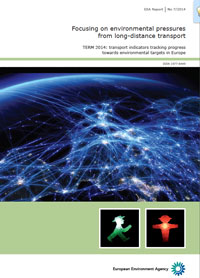| Dec 09, 2014 | |
More action needed to reduce transport's environmental impact |
|
| (Nanowerk News) The transport sector is still generating excessive greenhouse gas emissions and harmful levels of air pollution and noise, according to the latest edition of the European Environment Agency's annual report on environment and transport. | |
 Europeans collectively travelled 6.4 trillion kilometres in 2012, according to the Transport and Environment Reporting Mechanism (TERM) 2014. While car transport made up more than 70 % of this distance, it has continued to decline since 2009. In contrast, air transport has increased very fast over recent decades. One factor behind this pattern may be changing consumption habits. Some research suggests that younger generations prefer to spend their disposable income on long distance travel rather than consumer products such as cars. Nonetheless, there is a wide variation across the EU. Per capita car travel peaked in 2004 in the original 15 EU Member States, while it continues to grow in the 13 newer members. Overall passenger transport demand fell 1.4 % in 2012, mainly due to the drop in car passenger travel. Freight transport volumes also fell in 2012, by 2.1 %. Transport's total energy demand has also fallen, continuing its year-on-year decline since demand peaked in 2007. Because these trends may be partly caused by the recession, it is unclear whether this will rebound in coming years. |
|
| Greenhouse gas emissions from transport fell 3.3 % in 2012, although they must continue to fall drastically meet targets over coming decades. Air pollutant emissions from most transport modes also decreased, apart from air pollution emitted by planes which increased for some pollutants. | |
| However, air quality is still harming health in Europe's cities. Levels of nitrogen dioxide and particulates in cities have been exacerbated by increasing proportions of diesel cars. This is partly a result of fuel tax policies in most European countries, which give preference to diesel over petrol-driven equivalents. | |
| The number of alternative fuel car registrations in 2013 increased slightly, compared to the previous year. Taken together, battery electric and plug-in hybrid vehicles account for 0.5 % of total new registrations in the EU. This sluggish growth may be partly due to incentives such as scrappage schemes and company car systems which continue to support internal combustion engine vehicles in many Member States. | |
| The new edition of the TERM report has a particular focus on long-distance travel. This area puts major pressure on the environment. While the vast majority of journeys are short distance, long distance freight and passenger transport demand together account for up to three-quarters of greenhouse gas transport emissions and a large proportion of air pollutant emissions. |
| Source: European Environment Agency |
